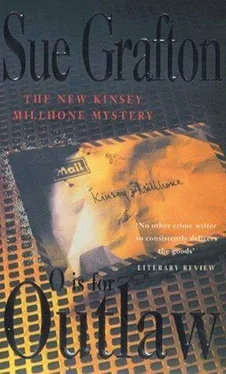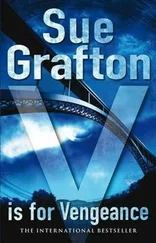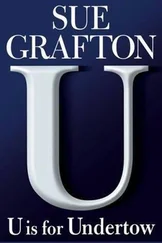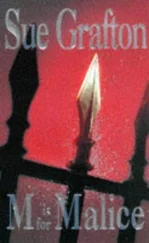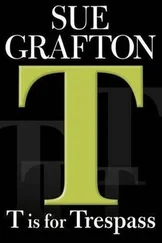It was in the Tulsa airport, while I was waiting between planes, that I made a discovery that cheered me up no end. I had an hour to kill so I'd stretched out in a chair, my legs extended into the aisle in front of me. The position, while awkward, at least permitted a catnap, though later I'd probably require hundreds of dollars' worth of chiropractic adjustment. In the meantime, I was using Mickey's leather jacket as a pillow, trying to ease the strain on my neck. I turned over on my side, not easy to do while sitting upright. As I did so, I felt something lumpy against my face-metal zipper tab, button?, I didn't know what it was, except that it added an unacceptable level of discomfort. I sat up and checked the portion of the jacket that was under my cheek. There was nothing I could see, but by pinching the leather I could feel an object in the lining. I flattened the jacket on my lap, squinting at the seam where I could see an alteration in the stitching. I opened my shoulder bag and took out my nail scissors (the same ones I utilize for the occasional emergency haircut). I picked a few stitches loose and then used my fingers to widen the opening. Out slid Duncan Oaks'sdog tags, the black-and-white snapshot, and the press card. Actually, the hiding place made perfect sense. Mickey'd probably worn this very jacket when he made the trip himself.
The dog tags bore Duncan Oaks's name and date of birth. Even all these years later, the chain was crusty with rust or blood. The snapshot was exactly as Duffy had described it. I set those items aside and studied the press card issued by the Department of Defense. The printing around the border said: LOSS OF THIS CARD MUST BE REPORTED AT ONCE. PROPERTY OF U.S. GOVERNMENT. Under the line that read non-combatant's certificate of identity was Duncan Oaks's name, and on the left was his picture. Darkhaired, unsmiling, he looked very young, which of course he was. The date of issue was 10 Sept. '65. Four years out of high school, he was no more than twenty-three years old. I studied his face. Somehow he seemed familiar, though I couldn't think why. I flipped the card over. On the back, he'd pasted a strip on which he'd written, In case of emergency, please notify Porter Yount, managing editor, Louisville Tribune.
My plane arrived in Louisville, Kentucky, at 5:0 P.M., at a gate so remote it appeared to be abandoned or under quarantine. I'd been in Louisville once before, about six months back, when a cross-country romp had ended in a cemetery, with my being the recipient of an undeserved crack on the head. In that case, as with this, I was out a substantial chunk of change, with little hope of recouping my financial losses.
As I passed through the terminal, I paused at a public phone booth and checked the local directory on the off chance I'd find Porter Yount listed. I figured the name was unusual and there couldn't be that many in the greater Louisville area. The high school librarian had told me the Tribune had been swallowed up by a syndicate some twenty years before. I imagined Yount old and retired, if he were alive at all. For once my luck held and I spotted the address and phone number of a Porter Yount, who I assumed was the man I was looking for. According to the phone book, he lived in the 1500 block of Third Street. I made a note of the address and continued to the baggage-claim level, where I forked over my credit card and picked up the keys to the rental car. The woman at Frugal gave me a sheet map and traced out my route: taking the Watterson Expressway east, then picking up I-65 north into the downtown area.
I found my car in the designated slot and took a moment to get my bearings. The parking lot was shiny with puddles from a recent shower. Given the low probability of rain any given day in California, I drank in the scent. Even the air felt different: balmy and humid with the late afternoon temperatures in the low 70s. Despite Santa Teresa's proximity to the Pacific Ocean, the climate is desert-like. Here, a moist spring breeze touched at newly unfurled leaves, and I could see pink and white azaleas bordering the grass. I shrugged out of Mickey's jacket and locked it in the trunk along with my duffel.
I decided to leave the issue of a motel until after I'd talked to Yount. It was close to the dinner hour, and chances were good that I'd find him at home. Following instructions, I took one of the downtown off-ramps, cutting over to Third, where I took a right and crossed Broadway. I drove slowly along Third, scanning house numbers. I finally spotted my destination and pulled in at a bare stretch of curb a few doors away. The tree-lined street, with its three-story houses of dark red brick, must have been lovely in the early days of the century. Now, some of the structures were run-down, and encroaching businesses had begun to mar the nature of the area. The general population was doubtless abandoning the once-stately downtown for the featureless suburbs.
Yount's residence was two and a half stories of red brick faced with pale fieldstone. A wide porch ran along the front of the building. Three wide bay windows were stacked one to a floor. An air conditioner extended from an attic window. The street was lined with similar houses, built close to one another, yards and alleyways behind. In front, between the sidewalk and the street, a border of grass was planted with maples and oaks that must have been there for eighty to a hundred years.
I climbed three steps, proceeded along a short cracked walkway, and climbed an additional six steps to the glass door with its tiny foyer visible within. Yount's residence had apparently once been a singlefamily dwelling, now broken into five units, judging from the names posted on the mailboxes. Each apartment had a bell, connected to the intercom located near the entrance. I rang Yount's apartment, waiting two minutes before I rang again. When it became clear he wasn't answering, I tried a neighbor's bell instead. After a moment, the intercom crackled to life and an old woman clicked in, saying, "Yes?"
I said, "I wonder if you can help me. I'm looking for Porter Yount."
"Speak up."
"Porter Yount in apartment three."
"What's the time?' I glanced at my watch. "Six-fifteen."
"He'll be down yonder on the corner. The Buttercup Tavern."
"Thanks."
I returned to the sidewalk, where I peered up and down the street. Though I didn't see a sign, I spotted what looked like a corner tavern half a block down. I left my car where it was and walked the short distance through the mild spring air.
The Buttercup was dark, cloudy with cigarette smoke, and smelling of bourbon. The local news was being broadcast at low volume on a color TV set mounted in one corner of the room. The dark was further punctuated by neon signs in a series of advertisements for Rolling Rock, Fehr's, and Stroh's Beer. The tavern was paneled in highly varnished wood with red leather stools along the length of the bar. Most of the occupants at that hour seemed to be isolated individuals, all men, all smoking, separated from each other by as many empty stools as space allowed. Without exception, each turned to stare at me as I came in.
I paused just inside the door and said, "I'm looking for Porter Yount."
A fellow at the far end of the bar raised his hand.
Judging from the swiveling heads, my arrival was the most interesting event since the Ohio River flooded in 1937. When I reached Yount, I held my hand out, saying, "I'm Kinsey Millhone."
"Nice meeting you," he said.
We shook hands and I perched on the stool next to his.
I said, "How are you?"
"Not bad. Thanks for asking." Porter Yount was heavyset, raspy-voiced, a man in his eighties. He was almost entirely bald, but his brows were still dark, an unruly tangle above eyes that were a startling green. At the moment, he was bleary-eyed with bourbon and hisbreath smelled like fruitcake. I could see the bartender drift in our direction. He paused in front of us.
Читать дальше
